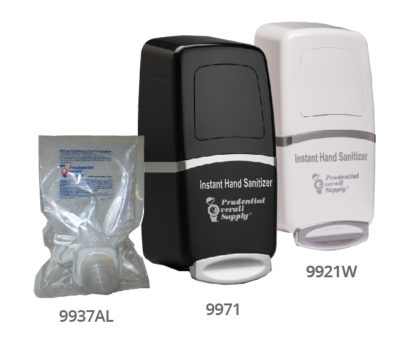Alcohol-Free vs. Alcohol-Based Hand Sanitizers: Which Is Best?

At Prudential Overall Supply, we’re proud to offer bulk hand sanitizer and other cleanliness products your business can depend on. Keeping your hands clean can prevent COVID-1 and other germs from spreading. The Centers for Disease Control and Prevention (CDC) recommends washing with soap and water or using hand sanitizer with at least 60% alcohol. However, with alcohol-based and alcohol-free hand sanitizers on the market, here is a look at the pros and cons of each.1
Alcohol-Free Hand Sanitizers
Usually available in a water-based foam, non-alcohol hand sanitizers offer a similar level of protection as those with alcohol. Benzalkonium Chloride is the active ingredient; the quaternary ammonium compound is typically present in concentrations of less than 0.1%. Vitamin E and green tea extract may be included as skin conditioners as well. Alcohol-free hand sanitizers are also:
- Easier on the hands and skin
- Not as harmful if accidentally ingested
- Non-flammable
- Protective even after dry
- Less expensive
While the solution can continue to kill bacteria after it has dried, it is generally less effective than alcohol. Being foam-based, the product will provide more applications per gallon, but this does require a dispenser with a foaming mechanism.
Alcohol-Based Hand Sanitizers
An alcohol-based product is still the best hand sanitizer favored by health organizations. Containing from 60% to 95% alcohol or isopropanol, it kills germs and bacteria upon contact. Clinical studies have proven time and again alcohol-based sanitizers are effective antiseptic solutions. Extensive research has shown they kill most known bacteria and viruses.
Based on CDC recommended hand sanitizer guidelines, you should use alcohol-based hand sanitizer whenever soap and water aren’t available, you visit a friend or loved one in a hospital/nursing home, or after blowing your nose, coughing, or sneezing.
However, despite their effectiveness, alcohol-based sanitizer products are:
- Highly flammable, requiring hospitals/facilities to consult local fire authorities before dispenser installation.
- Potentially toxic if ingested and can cause alcohol poisoning in children and adults.
- Not as effective if your hands are heavily soiled or greasy.
- Apt to strip away moisture, leading to dry, cracked skin.
- Not able to remove chemicals, heavy metals, or pesticides.

To be effective, alcohol-based hand sanitizers must be used in a large enough volume. Users should not wipe themselves dry before the gel evaporates, as it may not inactivate all microbes. When you select an alcohol-based product, make sure it has at least 60% alcohol; lower concentrations may only reduce the growth of germs rather than kill them. These sanitizers are also not as effective for certain types of germs, such as norovirus, Cryptosporidium, and Clostridium difficile.
Order Sanitizer Products from Prudential Overall Supply
Our product selection will help your facility follow CDC hand sanitizer recommendations. We supply alcohol-based bulk hand sanitizer in the form of antiseptic gels, foams, and sprays, as well as various soap and paper products. Submit your request for a quote or call 800-767-5536 to learn more about these and our PPE, workwear, and cleanroom products and services.
Source: